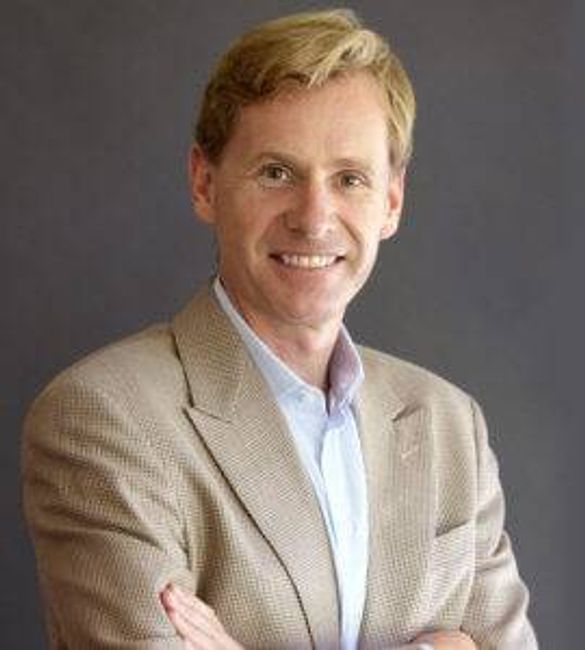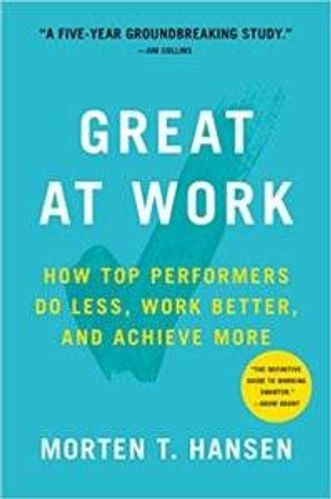How to Work Less and Achieve More
Advice from the author of the new book, 'Great at Work'
Morten Hansen, a management professor at University of California, Berkeley, and author of the fascinating new book, Great at Work, thinks the way we work is “broken.” He says: “We pursue a paradigm of ‘more is better’ — but more hours doesn’t lead to better performance. And it leads to worse work/life balance.’”

To find out what really drives performance at work, he surveyed 5,000 managers and employees. What he found: top performers do a few smart things that let them work less and achieve more. “My mission is to help people work better,” Hansen told me.
Here’s my interview with Hansen, including more about his findings and his advice for workers in their 50s and 60s to help them work better and have a life:
Next Avenue: What surprised you in your survey results?

Morten Hansen: I was surprised by a number of things. Many aspects of work have certain conventions that are not quite right. For instance, having passion in your job is important, but that itself does not make you a top performer. And I found that focusing at work was a good thing by itself, but focus does not explain the difference between good and great performance. We walk around with misguided conceptions about work and we need to correct them.
Your research found that top performers work less and achieve more. That sounds like an oxymoron. Why isn’t it?
Top performers are very selective in what they do. They don’t work crazy hours or spread themselves across many tasks. They don’t go to an endless amount of collaboration meetings. They do fewer things.
It’s counterintuitive. It’s not how much you can get done in a day, but how few things you have to do in order to excel.
But bosses often say: ‘You have to do everything.’
If you’re lucky to have a do-less boss, that makes life easier for you. If not, then when you’re asked to do a lot of things, push back properly. Say: ‘You asked me to do two things last week and now you’re asking for a third. Which should I prioritize? I can do all three, but it won’t be high-quality work.’ You’re not saying ‘I don’t want to do it.’
This requires some courage and tact.
But a lot of people in my research just take what they’re told to do and say to themselves ‘I’ll just do it.’
Did you find differences between older workers and younger workers in being good at doing this?
What was interesting is that there was no age difference in whether older people or younger people were better at this.
I’m speculating, but I can imagine that older people should be better. They have more experience and wisdom. They can say to themselves: ‘I’ve been there when my work was spread across 10 things and that didn’t work out well.’
So age was not a factor in whether workers were top performers?
If you plug in age as a variable, does it explain performance? The answer is: It doesn’t.
Ageism suggests that older workers are not as good as they used to be or as good as younger workers who have more energy and are more committed and not as tired. But in reality, our data doesn’t say that older people perform at lesser levels. That’s a misconception and a stereotype.
Isn’t there a danger that you’ll get fired if you don’t do all the things your boss asks for?
When you want to do fewer things to do better work, you run the risk of getting misunderstood. But what’s often the case with good performers is that they might say things to their boss like: ‘I’m happy to help out, but which of the other things can I postpone?’
Then, if your boss takes something off your workload, two weeks later you better start showing quality work. If you don’t, this can backfire on you.

You say ‘Do Less, Then Obsess.’ What does that mean?
The ‘obsess' part is the counterintuitive finding. You have to obsess about the things you focus on at work. Dedicating all your efforts into producing high-quality work means paying attention to details. That takes time.
A lot of people make many PowerPoint presentations and put in many slides. What if you made fewer presentations with fewer slides, but the slides you made were really good?
You found in your survey that people who performed better at work were happier outside of work. Tell me about that.
That wasn’t something I expected. But it was a big insight that’s important.
Most of us, including myself, have problems protecting our private lives from the demands of work. We have conference calls at 7 p.m. on Sundays. We check our emails at our kids’ and grandkids’ soccer games.
People who are able to be selective and say ‘no’ create some extra hours in the day that they can spend on their private lives.
Top performers work 60 hours a week, on average. That’s a lot of hours, but it’s not 65 hours, either.
You say there are seven work-smart practices. What are a few of them that are especially good for people in their 50s and 60s?
Let’s talk about passion and purpose. The conventional wisdom — what you hear at commencement speeches at universities — is that you should do what you love and the rest will work itself out. Well, it doesn’t always work itself out.
The problem with only pursuing your passion is that there’s another part of work to consider: purpose. Doing something that contributes. Those are very different concepts.
If you’re only thinking about your passion [as you start] your second or third career, maybe doing part-time work related to hobbies you really enjoy, the problem is that it may not contribute much to the rest of the world.
But if you contribute something of real value, it usually has an economic benefit to it. That’s why for anyone looking for a second or third career, it’s important to pursue passion and purpose. The top performers in our study had both.
It’s not that they worked more hours in a day. They put in more energy per hour of work and were more dedicated. Doing better work translates into better performance.
You don’t have to work for a nonprofit to have passion and purpose. An insurance agent can have a lot of purpose by helping people.
What is the ‘spread too thin’ trap and how can people avoid it?
That is when you’re just adding more to your to-do list.
You said ‘yes’ to two assignments and now you have three or four or five. What happens? You only have a fixed amount of time and energy. If you now have five things to do, you have to spread your hours across them all. And at some point, you’re spending too little time to do these things well.
That’s a way of not performing well. At some point, your work starts to suffer.
What can someone do to prevent this?
Write your work to-do list. Now, rank order what is most important and then take the list and circle the top five things and find ways to cut off the bottom five.
You also say: Don’t just learn — loop. What does that mean?
How often do you try to improve on things you frequently have to do at work, like running meetings? Maybe 10 percent of people do. Ninety percent of people are not trying to improve in the key things they are doing at work.
Take a top athlete like Roger Federer. He doesn’t just go out there and hit the ball. He does intense practice. He serves, measures the outcomes and gets feedback from his coach and then slightly tweaks his serve. You can do that in the way you run meetings. But people don’t. Instead, they just rely on their annual performance review to get better. It’s pointless.
Learn and loop means focusing on one key thing at a time and seeing how you did and then modifying for the next time. Then, tweak this again and measure yourself again. Keep on looping.
What’s your advice for someone 50 or older who worries about getting laid off due to his or her age?
If you show up to work tired, you’re giving a bad impression. But if you have passion and purpose and show up with more energy, you perform better. That is the greatest insurance against being laid off.
I’m 53 and have been an academic for years. ‘What is my new passion and purpose?’ is what I’m trying to do. It’s a very uplifting way of thinking. It’s a way of keeping yourself young in your mind, in many ways. Asking yourself: ‘What is my passion and purpose?’ is one of the most important questions you can ask yourself when you’re turning 50.


